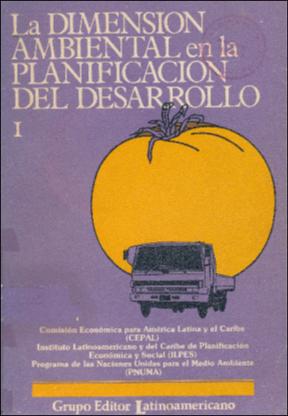- Biblioteca CEPAL
- Biblioguias
- ILPES_en
- Planning for development in the 60 years of ILPES
- Mid-1970s to late 1980s
Planning for development in the 60 years of ILPES
Mid-1970s to late 1980s (1977-1990): The decline of development planning
The period from the 1970s to the late 1980s was one of profound economic, political, social, and territorial transformations in Latin America and the Caribbean. The external debt crisis and the implementation of structural adjustment policies by different countries in the region as promoted within the Washington Consensus prompted the adoption of a new style of development in the region. This period marked a turning point worldwide in economic thinking on the role of the market as the main mechanism for promoting development, and in Latin America and the Caribbean this change led to an increased deregulation and liberalization of economies, a deepening of an insertion in external markets through the promotion of exports, and a reorganization of public finances, with the subsequent reduction of the State and its diminished intervention in the economy.
From the 1970s onwards, the State and planning ceased to carry the weight of the previous period due to shifts in the development model adopted by most of the countries in the region. During this period, public policies ceased to consider long-term planning because the macroeconomic crisis, hyperinflation and stagnant growth dominated the attention of public programs. In this regard, the focus of much of the work of ILPES and ECLAC was on how to manage the crisis.
During this period, ILPES’ research focused on public sector economic programming, social policies, investment and project programming, and regional planning and policies. Regarding the latter, inequality as a problem resulting from new development patterns began to guide thinking on territorial development. Since the mid-1960s, regional development had been part of ILPES' school of thought. During this period, with respect to the determinants of territorial development and the alternatives for reducing existing inequalities in Latin America and the Caribbean, the concept of endogenous development emerged, and the limits imposed by capitalist accumulation to achieve a more balanced socio-spatial development were debated.
Featured publications
-
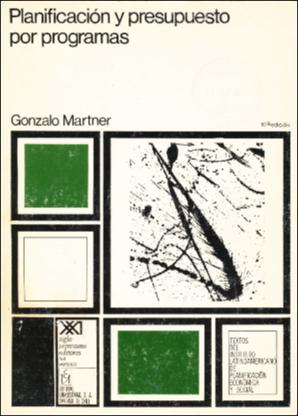 Planificación y presupuesto por programas
by
Publication Date: 1976
Planificación y presupuesto por programas
by
Publication Date: 1976 -
 La planificación del desarrollo agropecuario: un enfoque para América Latina
by
Publication Date: 1977
La planificación del desarrollo agropecuario: un enfoque para América Latina
by
Publication Date: 1977 -
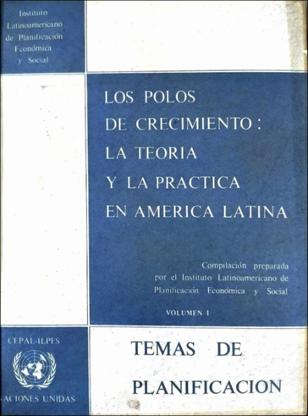 Polos de crecimiento: la teoría y la práctica en América Latina
by
Publication Date: 1978
Polos de crecimiento: la teoría y la práctica en América Latina
by
Publication Date: 1978 -
 Guía para la presentación de proyectos
by
Publication Date: 1979
Guía para la presentación de proyectos
by
Publication Date: 1979 -
 Dimensiones de una planificación participativa
by
Publication Date: 1980
Dimensiones de una planificación participativa
by
Publication Date: 1980 -
 Experiencias de planificación regional en América Latina: una teoría en busca de una práctica
by
Call Number: E/CEPAL/ILPES/G.6Publication Date: 1981
Experiencias de planificación regional en América Latina: una teoría en busca de una práctica
by
Call Number: E/CEPAL/ILPES/G.6Publication Date: 1981 -
 Estilos de planificación y sistemas de empresas públicas en América Latina
by
Call Number: E/CEPAL/ILPES/R.41Publication Date: 1981
Estilos de planificación y sistemas de empresas públicas en América Latina
by
Call Number: E/CEPAL/ILPES/R.41Publication Date: 1981 -
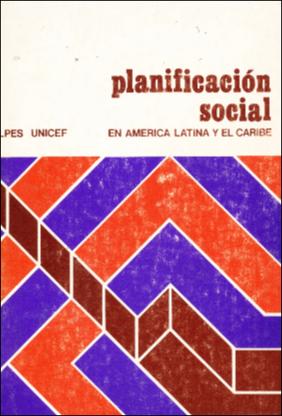 Planificación social en América Latina y el Caribe
by
Publication Date: 1981
Planificación social en América Latina y el Caribe
by
Publication Date: 1981 -
 Planificación, ciencia y tecnología y toma de decisiones para el desarrollo de América Latina y el Caribe
by
Call Number: E/CEPAL/ILPES/R.38Publication Date: 1981
Planificación, ciencia y tecnología y toma de decisiones para el desarrollo de América Latina y el Caribe
by
Call Number: E/CEPAL/ILPES/R.38Publication Date: 1981
-
 Proceso de planificación municipal: actualidad y futuro de lo local
by
Call Number: E/CEPAL/ILPES/R.36Publication Date: 1981
Proceso de planificación municipal: actualidad y futuro de lo local
by
Call Number: E/CEPAL/ILPES/R.36Publication Date: 1981 -
 Política económica, organización social y desarrollo regional: elementos para armar una teoría del desarrollo regional
by
Call Number: E/CEPAL/ILPES/G.13Publication Date: 1982
Política económica, organización social y desarrollo regional: elementos para armar una teoría del desarrollo regional
by
Call Number: E/CEPAL/ILPES/G.13Publication Date: 1982 -
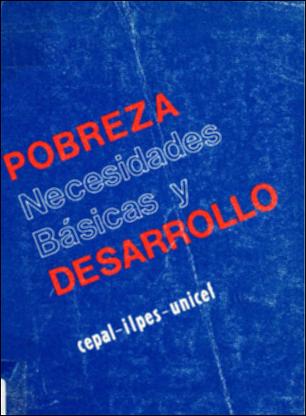 Pobreza, necesidades básicas y desarrollo
by
Call Number: E/ICEF/TACRO/G.1006Publication Date: 1982
Pobreza, necesidades básicas y desarrollo
by
Call Number: E/ICEF/TACRO/G.1006Publication Date: 1982 -
 Disparidades regionales y pobreza
by
Publication Date: 1984
Disparidades regionales y pobreza
by
Publication Date: 1984 -
 Industrialização e desenvolvimento do Nordeste: anais do Seminário realizado em Brasília
by
Call Number: LC/BRS/L.1(SEM.4/1)Publication Date: 1985
Industrialização e desenvolvimento do Nordeste: anais do Seminário realizado em Brasília
by
Call Number: LC/BRS/L.1(SEM.4/1)Publication Date: 1985 -
 Aspectos metodológicos de las políticas de desarrollo social
by
Call Number: LC/IP/G.24Publication Date: 1985
Aspectos metodológicos de las políticas de desarrollo social
by
Call Number: LC/IP/G.24Publication Date: 1985 -
-
 Notas para una discusión sobre algunos aspectos de la planificación
by
Publication Date: 1986
Notas para una discusión sobre algunos aspectos de la planificación
by
Publication Date: 1986
-
 Towards a new planning approach in the small Caribbean countries
by
Call Number: LC/CAR/R.191Publication Date: 1986
Towards a new planning approach in the small Caribbean countries
by
Call Number: LC/CAR/R.191Publication Date: 1986 -
Veinticinco años del ILPES by
Call Number: (LC/G.1491-P)Publication Date: 1987En: Revista de la CEPAL, No.33 págs. 183 - 185. -
 Ensayos sobre descentralización y desarrollo regional
by
Call Number: LC/IP/G.42-PPublication Date: 1987Cuadernos del ILPES No. 32
Ensayos sobre descentralización y desarrollo regional
by
Call Number: LC/IP/G.42-PPublication Date: 1987Cuadernos del ILPES No. 32 -
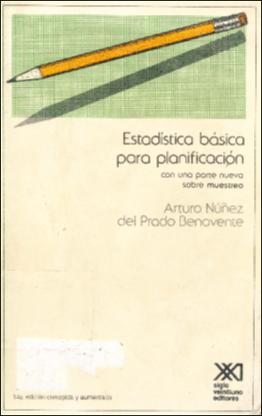 Estadística básica para planificación con una parte nueva sobre muestreo
by
Publication Date: 1987
Estadística básica para planificación con una parte nueva sobre muestreo
by
Publication Date: 1987 -
 Construcción y uso de modelos econométricos en la previsión y planificación económicas
by
Publication Date: 1987
Construcción y uso de modelos econométricos en la previsión y planificación económicas
by
Publication Date: 1987 -
 Bases metodológicas y operativas para la administración de la inversión pública
by
Publication Date: 1988
Bases metodológicas y operativas para la administración de la inversión pública
by
Publication Date: 1988 -
 La inversión pública y el ciclo de los proyectos = Public investment and the project cycle
by
Call Number: LC/IP/R.67Publication Date: 1988
La inversión pública y el ciclo de los proyectos = Public investment and the project cycle
by
Call Number: LC/IP/R.67Publication Date: 1988 -
 Aspectos conceptuales y operativos del proceso de planificación de la salud
by
Call Number: LC/IP/G.53-PPublication Date: 1989
Aspectos conceptuales y operativos del proceso de planificación de la salud
by
Call Number: LC/IP/G.53-PPublication Date: 1989 -
 Sistema de información y predicción macroeconómico para la planificación
by
Call Number: LC/IP/G.46Publication Date: 1989Proyecto de Elaboración y Difusión de Nuevas Técnicas en la Planificación y Programación de Políticas Públicas RLA/86/029
Sistema de información y predicción macroeconómico para la planificación
by
Call Number: LC/IP/G.46Publication Date: 1989Proyecto de Elaboración y Difusión de Nuevas Técnicas en la Planificación y Programación de Políticas Públicas RLA/86/029
A selection of seminars (mid-1970s to late 1980s)
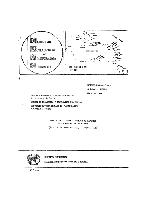
Informe de la Primera Reunión de Expertos en Planificación del Caribe / CEPAL. Oficina para el Caribe (1979)
Meeting held in Havana, 25-31 January 1979. E/CEPAL/CDCC/49/REV.3
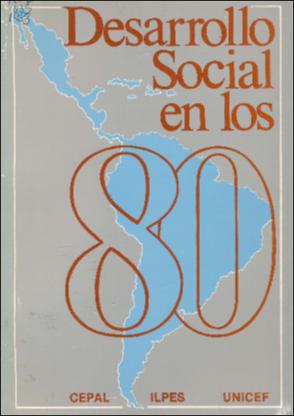
Desarrollo social en los 80 / Rolando Franco y J.C. Zavala (1983)
International Symposium on Social Development Policies in Latin America and the Caribbean during the Decade of the Eighties, Santiago, Chile, 12-15 April 1982, organized by ILPES, ECLAC, UNICEF (Regional Office for the Americas).

Coloquio Internacional sobre Nuevas Orientaciones para la Planificación en Economías de Mercado (1987)
International Colloquium on New Orientations for Planning in Market Economies, organized jointly by the Latin American and Caribbean Institute for Economic and Social Planning (ILPES) and the United Nations Development Programme (UNDP) in Santiago, Chile, 25-27 August 1986. Published in CEPAL Review No. 31. (LC/G.1452)

La democracia frente al reto del Estado eficiente / A. Costa Filho; B. Kliksberg; y J. Martín (comp.) | CEPAL-ILPES / PNUD (1988)
Latin American Meeting on Economic Planning and Public Management: Democracy facing the Challenge of the Efficient State in Buenos Aires, Argentina, 23-26 September 1987 Edition for the XXV Anniversary of ILPES.
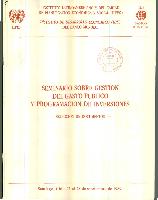
Selection of documents submitted to the Seminario "Gestión del Gasto Público y Programación de Inversiones" / CEPAL-ILPES / Banco Mundial (1990)
Seminar on Public Expenditure Management and Investment Programming in Santiago, Chile, 25-28 September 1989, organized by ILPES and the Economic Development Institute (EDI) of the World Bank. (LC/IP/L.30)
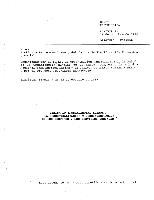
Seminario Interagencial acerca de la Descentralización y Desconcentración de los Sectores y los Servicios Sociales (1990)
Seminar held in Brasilia, Brazil 9-12 October 1989, organized by ILPES, PAHO/WHO, OREALC/UNESCO. (LC/IP/R.81)

